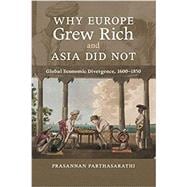
Note: Supplemental materials are not guaranteed with Rental or Used book purchases.
Purchase Benefits
Looking to rent a book? Rent Why Europe Grew Rich and Asia Did Not: Global Economic Divergence, 16001850 [ISBN: 9780521168243] for the semester, quarter, and short term or search our site for other textbooks by Prasannan Parthasarathi. Renting a textbook can save you up to 90% from the cost of buying.
| List of figures | p. viii |
| List of maps | p. ix |
| List of tables | p. x |
| Acknowledgments | p. xi |
| List of abbreviations | p. xiv |
| Maps | p. xv |
| Introduction | p. 1 |
| Setting the stage: Europe and Asia before divergence | |
| India and the global economy, 1600-1800 | p. 21 |
| Political institutions and economic life | p. 51 |
| The divergence of Britain | |
| The European response to Indian cottons | p. 89 |
| State and market: Britain, France and the Ottoman Empire | p. 115 |
| From cotton to coal | p. 151 |
| The Indian path | |
| Science and technology in India, 1600-1800 | p. 185 |
| Modern industry in early nineteenth-century India | p. 223 |
| Conclusion | p. 263 |
| Notes to the text | p. 270 |
| Bibliography | p. 324 |
| Index | p. 353 |
| Table of Contents provided by Ingram. All Rights Reserved. |
The New copy of this book will include any supplemental materials advertised. Please check the title of the book to determine if it should include any access cards, study guides, lab manuals, CDs, etc.
The Used, Rental and eBook copies of this book are not guaranteed to include any supplemental materials. Typically, only the book itself is included. This is true even if the title states it includes any access cards, study guides, lab manuals, CDs, etc.